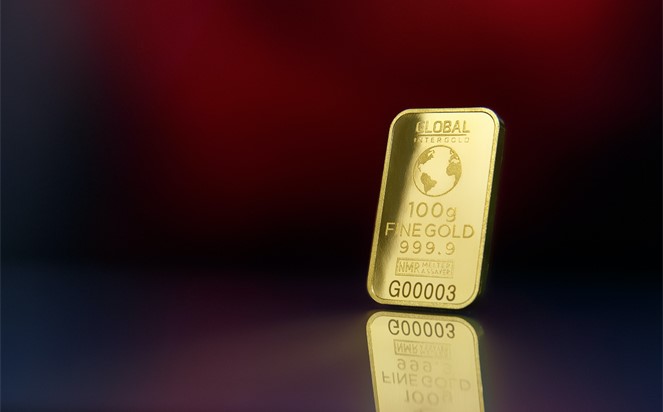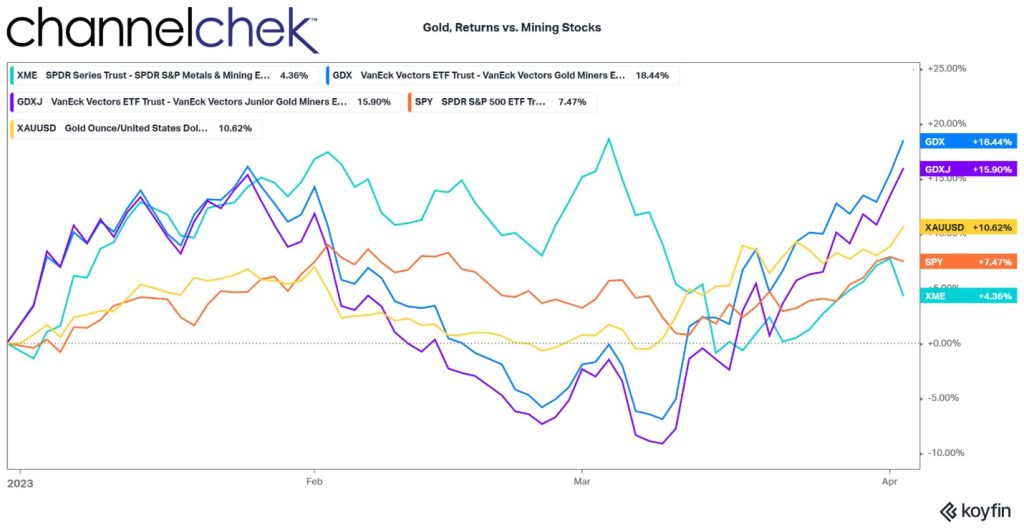
Are Safe Haven Investments Just Beginning Their Rise?
Gold is continuing to move up. Fueled by global tensions, rising prices, a weakening dollar, and new wariness of the banking system, gold seems to have regained its place as a safe haven portfolio allocation. Over the past five calendar days, the precious metal has gained $84 per ounce or 4.3%. In recent days price movement has been helped by lower yields on U.S. Treasuries and OPEC+ oil production cuts which can be expected to increase inflationary pressures as the cost of transportation and production rises for the majority of new goods.
Physical gold, priced in $USD, as seen on the chart below, is up 10.62% on the year. But that does little to tell the recent story. The investments in the yellow metal had gone negative on the year until two days before the Silicon Valley Bank’s problems became widely known in early March. This means much of the current increase on the year has occurred in under a month’s time. And the mindset that is driving the rise seems to be lingering.
Technicians point out that the $2020 level was an area of resistance that traders easily pushed through on Tuesday. Are there also fundamental reasons for it to continue its upward climb?
Global Tensions
Global tensions and geopolitical events can have a significant impact on the price of gold. Uncertainty surrounding the war in Europe, U.S. enemies forming closer alliances with each other, and a former U.S. President being indicted are providing heightened tensions. Gold has remained a safe-haven asset historically because investors turn to in times of political or economic uncertainty – it is perceived to be a store of value that is less vulnerable to fluctuations in currency values and stock markets.
We are in times of political and economic certainty now, this can continue to increase the demand for gold and drive up its price.
Inflation
Gold is often considered a hedge against inflation, so as inflation rises, the price of gold tends to increase. Recent reports in the U.S. have shown inflation, especially core inflation (net of food and energy price changes), has resumed an upward move. The spike in oil stemming from recently announced production cuts should increase both core and overall inflationary pressures.
When inflation is running high, the value of the U.S. dollar erodes. Investors gravitate to alternative stores of wealth that can maintain their purchasing power. Gold is seen as a safe-haven asset that can protect against inflation and currency devaluation. As a result, investors tend to buy more gold, driving up its price.

Weaker Dollar
As mentioned above, a weakening U.S. dollar can have a significant impact on the price of gold expressed in U.S. dollars. Precious metals are typically priced in terms of U.S. dollars globally. When inflation runs higher than safe-haven U.S. Treasury yields than assets move toward alternatives like gold, real estate, or cryptocurrencies.
As a result, when the U.S. dollar weakens, the demand for gold may increase, driving up its price.
Systemic Risk
The risk of bank failures can impact gold prices in several ways. In times of perceived financial instability and/or economic uncertainty, investors’ confidence in banks and other financial institutions weakens. This often leads to a shift to safe-haven assets like gold.
In addition, if there is a continued risk of bank failures. If it happens, central banks could take steps to stabilize the financial system by injecting liquidity into the markets and lowering interest rates. These actions weaken currency which increases inflation. Inflation expectations, as mentioned earlier, support higher gold prices.

Gaining Exposure
The chart shows the correlation between gold, and mining stocks since the beginning of the year. As a reference, the performance of the VanEck gold mining ETF (GDX), and the junior gold mining ETF (GDXJ) are charted against the S&P 500 (SPY), and an S&P mining index (XME). The XME is designed to track changes across a broad market-cap spectrum of metals and mining segments in the U.S.
The mining stocks have been moving in the same direction and pivoting at the same time as gold (XAUUSD). The difference is the moves have been more pronounced (up and down) for the mining stocks.
Investors expecting gold to continue to increase and considering increasing their exposure to safe-haven precious metals, ought to do their due diligence and determine if gold mining stocks are a better fit for what they are trying to accomplish.
In his Metals & Mining First Quarter 2023 Review and Outlook (April 3, 2023) Mark Reichman, Senior Research Analyst, Natural Resources, at Noble Capital Markets provides various potential scenarios to his outlook for gold and other metals. The report (available at this link) is a good place to start to weigh this industry expert’s considerations with your own.
Managing Editor, Channelchek
Sources
https://www.channelchek.com/news-channel/metals-mining-first-quarter-2023-review-and-outlook